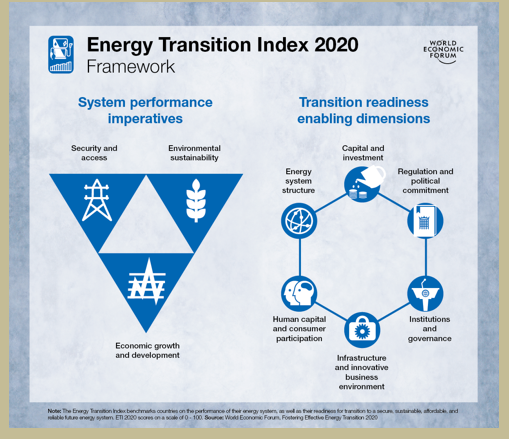Global Energy Transition Index 2020
- Posted By
10Pointer
- Categories
Environment
- Published
15th May, 2020
-
-
Context
- According to the World Economic Forum (WEF), India has moved up two positions to rank 74th on a global ‘Energy Transition Index’ with improvements on all key parameters of economic growth, energy security and environmental sustainability.
- Releasing the annual rankings, the Geneva-based international organisation for public-private cooperation said Covid-19 will compromise the transition to clean energy without an urgent stakeholder action as unprecedented disruptions due to the pandemic threaten this transition.
-
Why benchmark energy systems?
- The Energy Transition Index (ETI) is a fact-based ranking intended to enable policy-makers and businesses to plot the course for a successful energy transition.
- The benchmarking of energy systems is carried out annually across countries. Part of the World Economic Forum’s Fostering Effective Energy Transition initiative, it builds on its predecessor, the Energy Architecture Performance Index.
- The ETI does not only benchmark countries on their current energy system performance, but also provides a forward?looking lens as it measures their readiness for the energy transition.
-
Who topped the Index?
- Sweden remains on the top on this annual list compiled by Geneva-based World Economic Forum (WEF) and is followed by Switzerland and Norway in the top three, as per its latest report.
- Among major economies, the United Kingdom (UK) is ranked seventh. Singapore has been ranked thirteenth, while Germany, Japan and the US have bagged the seventeenth, eighteenth and the twenty-seventh place respectively.
-
How does India’s rank imporved?
- It said India is amongst the countries with high pollution levels and has a relatively high CO2 intensity in its energy system.
- Despite this, India has made significant strides to improve energy access in recent years, and currently scores well in the area of regulation and political commitment towards energy transition.
- It suggested there was a ground for optimism regarding India despite the current outdated energy system not being ready for transition, because an enabling environment is being built to support future transition.
- While India has scored low in terms of system performance (ranking 97 and 86, respectively), it ranks considerably higher when it comes to readiness (45 and 61, respectively). Overall, India has moved up two places from 78th last year.
- Despite its low ranking, India is the second best in the BRICS block of emerging economies, with Brazil being the best at 46th place globally.
- However, India is the only amongst the five economies to improve its rank since last year.
-
What are the cascading effects of COVID-19?
- Beyond the uncertainty over its long?term consequences, COVID-19 has unleashed cascading effects in real time:
- The erosion of almost a third of global energy demand
- Unprecedented oil price volatilities and subsequent geopolitical implications
- Delayed or stalled investments and projects
- Uncertainties over the employment prospects of millions of energy?sector workers
-
How is the report prepared?
- The ‘transition readiness’ component of the index has taken into account six individual indicators: capital and investment, regulation and political commitment, institutions and governance, institutions and innovative business environment, human capital and consumer participation, and energy system structure.
- The WEF said its index considers both the current state of the countries’ energy system and their structural readiness to adapt to future energy needs.
-
What does the report say?
- The WEF said energy systems have globally become less affordable and less environmentally sustainable than they were five years ago, though access to energy has improved with less than 1 billion now living without access to electricity.
- The biggest challenge facing attempts to future proof global energy is the lack of readiness among the world’s largest emitters.
- The 10 countries that score the highest in terms of readiness account for a mere 2.6 per cent of global annual emissions, the study found.
- Across 115 economies, more people than ever before now have access to energy. However, this is offset by reduced affordability and almost no progress in making energy systems environmentally sustainable.
- It said continued use of coal for power generation in Asia, increasing commodity prices and slower-than-needed improvements in energy intensity have contributed to this year’s stagnation in performance.
- The WEF said fossil fuels’ share of total primary energy supply at 81 per cent has been constant over the past three decades.
- Also, the global CO2 emissions are expected to have increased by more than 2 per cent in 2018, the highest since 2014.
- While the US has made progress in reducing the use of coal in power generation, it slipped in the rankings by four places reflecting concerns about the affordability of energy to households, and regulatory uncertainty on environmental sustainability.

